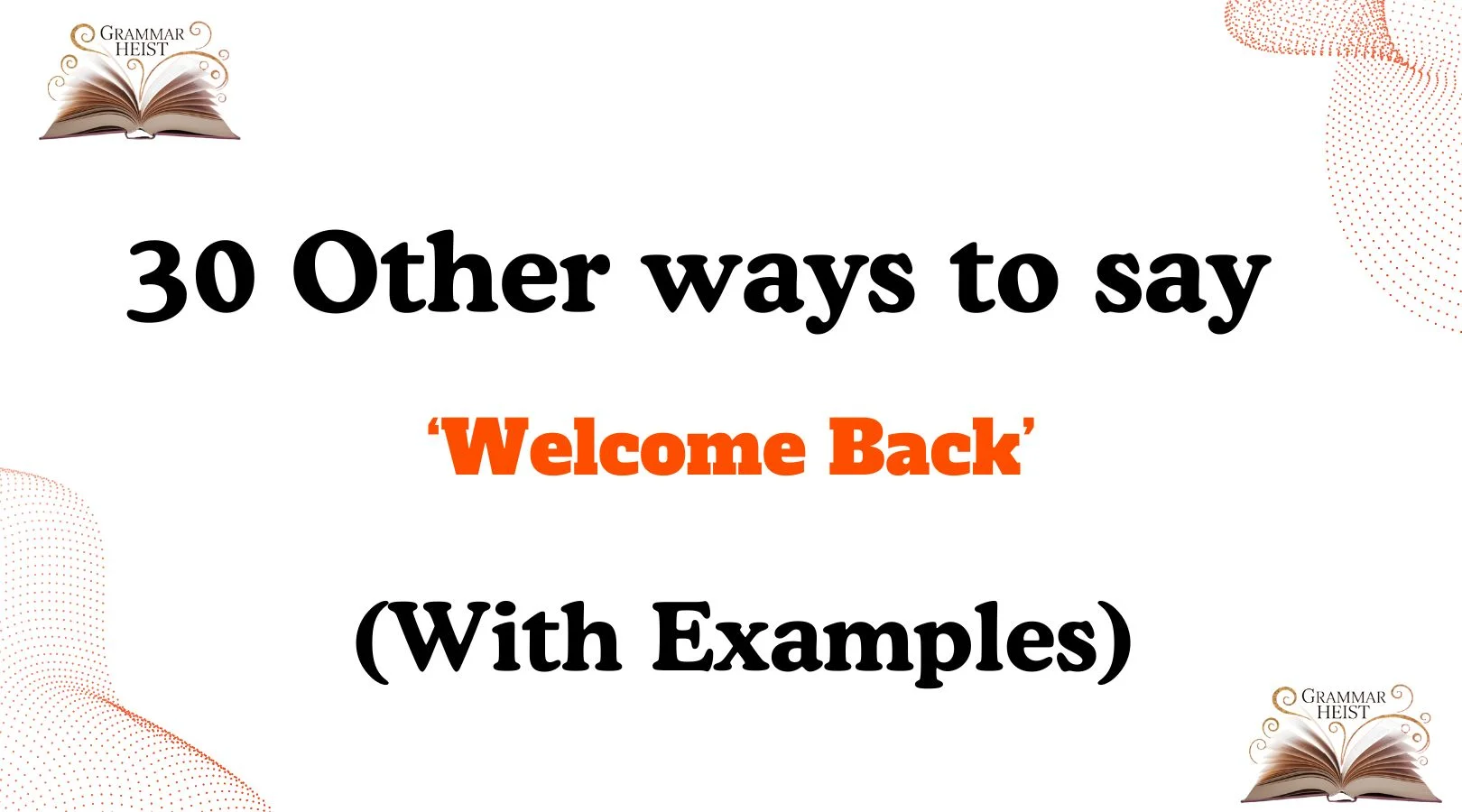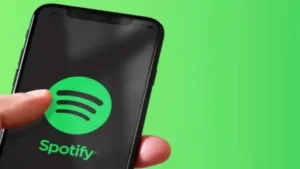Finding the right words when greeting someone can make all the difference in how warm and genuine your message feels. A simple “welcome back” is nice, but there are so many thoughtful alternatives that can make your words feel more personal, caring, and memorable. Whether you’re speaking to a friend, a colleague, or a loved one, using the right phrase shows you value their return and are truly glad to see them again.
What Does “Welcome Back” Mean?
The phrase “welcome back” is used to warmly greet someone returning after being away. It’s an acknowledgment of absence paired with appreciation for their return, often carrying warmth, comfort, and friendliness.
Is It Professional/Polite to Say “Welcome Back”?
Yes, “welcome back” is professional and polite. It works in both formal and casual settings—from office greetings after vacation to heartfelt reunions with family. However, depending on context, you may want to choose an alternative that feels more empathetic, enthusiastic, or professional.
Pros or Cons of Saying “Welcome Back”
Pros:
- Simple, warm, and universally understood.
- Suitable for both personal and professional settings.
- Expresses genuine appreciation for someone’s return.
Cons:
- Can sometimes sound generic or overused.
- May not convey deep emotions or personal warmth on its own.
Synonyms For “Welcome Back”
- Great to Have You Back
- So Glad You’re Back
- Welcome Home
- Happy to See You Again
- We Missed You
- Glad You’re Here Again
- Good to See You Again
- Delighted to Have You Back
- So Nice to Have You Back
- We’re So Happy You’re Back
- Wonderful to See You Again
- The Place Hasn’t Been the Same Without You
- You Were Missed Around Here
- Thrilled to Have You Back
- Welcome Back, We Missed Your Energy
- It’s Like You Never Left
- Good to Have You With Us Again
- We’ve Been Waiting for You
- The Team Feels Complete Again
- Your Presence Was Missed
- Back Where You Belong
- It’s So Good to Have You Around Again
- We’re Complete Again
- Nice Having You Back
- The Office Feels Right Again
- Everything Feels Better With You Here
- The Wait Is Over
- Glad Things Are Back to Normal
- We Couldn’t Wait for You to Return
- It’s Wonderful Having You Back
1. Great to Have You Back
Scenario: Perfect for professional settings when a colleague returns after vacation, leave, or illness.
Examples:
- “It’s great to have you back on the team!”
- “Great to have you back in the office, we missed your energy.”
- “Great to have you back—things weren’t the same without you.”
Tone: Warm, professional, and positive.
Explanation: This phrase shows appreciation for their presence and reassures them that their contributions are valued.
2. So Glad You’re Back
Scenario: Best for friends, family, or colleagues you feel close to.
Examples:
- “So glad you’re back, I really missed you.”
- “So glad you’re back—now it feels normal again.”
- “So glad you’re back, we’ve been waiting for you.”
Tone: Personal, emotional, and heartfelt.
Explanation: This phrase highlights joy and relief, making the person feel deeply welcomed.
3. Welcome Home
Scenario: Ideal for someone returning from travel, deployment, or a long stay away.
Examples:
- “Welcome home! It hasn’t been the same without you.”
- “Welcome home—we’ve all been waiting.”
- “Welcome home, hope your journey was smooth.”
Tone: Warm, comforting, and close.
Explanation: More intimate than “welcome back,” it conveys safety, belonging, and affection.
4. Happy to See You Again
Scenario: Works in both personal and workplace interactions.
Examples:
- “Happy to see you again, how have you been?”
- “Happy to see you again—it feels good to catch up.”
- “Happy to see you again after so long!”
Tone: Friendly, polite, and approachable.
Explanation: This option is versatile, striking a balance between professional warmth and casual friendliness.
5. We Missed You
Scenario: Best when you want to show genuine warmth, whether in a workplace or personal setting.
Examples:
- “We missed you around here—it’s so good to see you back.”
- “We missed you, the team hasn’t been the same.”
- “We missed you so much, welcome back!”
Tone: Caring, affectionate, and heartfelt.
Explanation: Highlights the person’s importance by acknowledging the void their absence created.
6. Glad You’re Here Again
Scenario: Works for both casual and professional greetings when you want to sound warm but not overly emotional.
Examples:
- “Glad you’re here again, we’ve got lots to catch up on.”
- “Glad you’re here again—it feels normal now.”
- “Glad you’re here again, we were waiting for this.”
Tone: Warm and genuine without being too formal.
Explanation: Balances friendliness with sincerity, making it appropriate for many contexts.
7. Good to See You Again
Scenario: A professional yet warm phrase suitable for colleagues, acquaintances, or even formal meetings.
Examples:
- “Good to see you again, welcome back.”
- “Good to see you again—it’s been too long.”
- “Good to see you again, hope you had a great time away.”
Tone: Polite, respectful, and positive.
Explanation: A versatile greeting that communicates appreciation without sounding overly emotional.
8. Delighted to Have You Back
Scenario: Works well in formal or semi-formal interactions when you want to show enthusiasm.
Examples:
- “Delighted to have you back with us.”
- “Delighted to have you back—you were missed.”
- “Delighted to have you back, things weren’t the same.”
Tone: Professional yet enthusiastic.
Explanation: Adds extra energy and excitement, showing that their presence is highly valued.
9. So Nice to Have You Back
Scenario: A friendly, casual phrase for personal or professional situations.
Examples:
- “So nice to have you back in the office.”
- “So nice to have you back—we missed your smile.”
- “So nice to have you back, it feels right again.”
Tone: Gentle, caring, and pleasant.
Explanation: Simple but warm, this phrase emphasizes kindness and comfort.
10. We’re So Happy You’re Back
Scenario: Great for group greetings where you want to emphasize collective happiness.
Examples:
- “We’re so happy you’re back with us.”
- “We’re so happy you’re back—things are better now.”
- “We’re so happy you’re back, everyone missed you.”
Tone: Enthusiastic and heartfelt.
Explanation: Reinforces a strong sense of belonging and appreciation from a group or team.
11. Wonderful to See You Again
Scenario: Perfect for formal or semi-formal contexts where you want to express elegance and warmth.
Examples:
- “Wonderful to see you again, I hope you’re doing well.”
- “Wonderful to see you again after your break.”
- “Wonderful to see you again, you were missed.”
Tone: Elegant, warm, and polite.
Explanation: Adds sophistication to your welcome, making it great for professional or special occasions.
12. The Place Hasn’t Been the Same Without You
Scenario: Works best in personal or team settings where you want to emphasize someone’s importance.
Examples:
- “The place hasn’t been the same without you—welcome back.”
- “The place hasn’t been the same without you, glad you’re here again.”
- “The place hasn’t been the same without you, things feel complete now.”
Tone: Heartfelt and affirming.
Explanation: Communicates how much the person’s presence impacts the environment.
13. You Were Missed Around Here
Scenario: Suitable for colleagues, teammates, or friends.
Examples:
- “You were missed around here, glad to have you back.”
- “You were missed around here—it’s not the same without you.”
- “You were missed around here, welcome back!”
Tone: Caring and sincere.
Explanation: A direct yet warm acknowledgment that their absence was noticed.
14. Thrilled to Have You Back
Scenario: Perfect when you want to add excitement and high energy to your greeting.
Examples:
- “Thrilled to have you back in action!”
- “Thrilled to have you back—it’s been too quiet.”
- “Thrilled to have you back, the team feels alive again.”
Tone: Energetic, enthusiastic, and positive.
Explanation: Shows great excitement and joy, making the return feel like a celebration.
15. Welcome Back, We Missed Your Energy
Scenario: Great for professional settings when someone’s personality or work style makes a difference.
Examples:
- “Welcome back, we missed your energy in the office.”
- “Welcome back, your positive spirit makes all the difference.”
- “Welcome back, we really missed your presence here.”
Tone: Appreciative and encouraging.
Explanation: Not only welcomes them back but also compliments their unique contributions.
16. It’s Like You Never Left
Scenario: Works best in casual, lighthearted conversations with friends, family, or close colleagues.
Examples:
- “It’s like you never left—we picked up right where we left off.”
- “It’s like you never left, everything feels normal again.”
- “It’s like you never left, glad you’re here.”
Tone: Playful and warm.
Explanation: This phrase brings comfort and familiarity, making the person feel seamlessly reintegrated.
17. Good to Have You With Us Again
Scenario: Professional but warm, suitable for teams, organizations, or formal greetings.
Examples:
- “Good to have you with us again, the team is complete now.”
- “Good to have you with us again after your leave.”
- “Good to have you with us again—your presence makes a difference.”
Tone: Respectful and professional.
Explanation: A formal yet caring way to acknowledge their return, ideal for workplace or academic settings.
18. We’ve Been Waiting for You
Scenario: Works when you want to show excitement and anticipation, especially with friends or close teams.
Examples:
- “We’ve been waiting for you, finally you’re back!”
- “We’ve been waiting for you—it feels right again.”
- “We’ve been waiting for you, welcome back.”
Tone: Excited and warm.
Explanation: Emphasizes eagerness and joy, making the return feel highly anticipated.
19. The Team Feels Complete Again
Scenario: Best in professional team environments where collaboration matters.
Examples:
- “The team feels complete again with you here.”
- “The team feels complete again, welcome back.”
- “The team feels complete again—things are better now.”
Tone: Professional, affirming, and inclusive.
Explanation: Reinforces the value of the individual as an essential team member.
Read More:30 Other Ways to Say ‘The Author States’ (With Examples)
20. Your Presence Was Missed
Scenario: Works for both personal and workplace interactions.
Examples:
- “Your presence was missed, welcome back.”
- “Your presence was missed—it feels better with you here.”
- “Your presence was missed, things weren’t the same without you.”
Tone: Respectful and caring.
Explanation: A warm but professional phrase that highlights appreciation without being overly casual.
21. Back Where You Belong
Scenario: Perfect for close friends, family, or supportive teams.
Examples:
- “Back where you belong—it feels right again.”
- “Back where you belong, welcome home.”
- “Back where you belong, we really missed you.”
Tone: Warm, reassuring, and personal.
Explanation: Creates a sense of belonging and comfort, reinforcing connection.
22. It’s So Good to Have You Around Again
Scenario: Friendly and casual, suitable for both social and work settings.
Examples:
- “It’s so good to have you around again, things feel lively.”
- “It’s so good to have you around again—we missed your energy.”
- “It’s so good to have you around again, welcome back.”
Tone: Friendly and inclusive.
Explanation: A simple phrase that warmly acknowledges their importance in the environment.
23. We’re Complete Again
Scenario: Best for teams, families, or groups where togetherness matters.
Examples:
- “We’re complete again now that you’re here.”
- “We’re complete again, welcome back.”
- “We’re complete again—it feels whole now.”
Tone: Emotional and collective.
Explanation: Reinforces the feeling that their presence makes the group whole.
24. Nice Having You Back
Scenario: A casual and polite greeting for both professional and personal interactions.
Examples:
- “Nice having you back in the office.”
- “Nice having you back—it feels good again.”
- “Nice having you back with us.”
Tone: Polite and neutral.
Explanation: A straightforward phrase that works in nearly any situation without being too emotional.
25. The Office Feels Right Again
Scenario: Workplace-specific, ideal for a returning colleague.
Examples:
- “The office feels right again now that you’re here.”
- “The office feels right again—we really missed you.”
- “The office feels right again, welcome back.”
Tone: Warm and professional.
Explanation: Acknowledges the difference they make in a professional setting while keeping it positive.
26. Everything Feels Better With You Here
Scenario: Works best in personal, friendly, or close workplace settings.
Examples:
- “Everything feels better with you here—welcome back.”
- “Everything feels better with you here, we missed you.”
- “Everything feels better with you here again.”
Tone: Caring and uplifting.
Explanation: Highlights the positive impact their presence has on the environment.
27. The Wait Is Over
Scenario: Playful and casual, often used with close friends or teammates.
Examples:
- “The wait is over—you’re back!”
- “The wait is over, finally!”
- “The wait is over, glad you’re here again.”
Tone: Fun and lighthearted.
Explanation: Adds excitement and a touch of humor to the greeting.
28. Glad Things Are Back to Normal
Scenario: Works in professional or casual settings after someone’s return brings balance.
Examples:
- “Glad things are back to normal now that you’re back.”
- “Glad things are back to normal, welcome home.”
- “Glad things are back to normal again—it feels good.”
Tone: Calm, reassuring, and appreciative.
Explanation: Recognizes their role in restoring balance and harmony.
29. We Couldn’t Wait for You to Return
Scenario: Suitable for close relationships or enthusiastic team environments.
Examples:
- “We couldn’t wait for you to return—welcome back.”
- “We couldn’t wait for you to return, glad you’re finally here.”
- “We couldn’t wait for you to return—it feels right now.”
Tone: Excited and heartfelt.
Explanation: Conveys eagerness and appreciation, showing how much their return was anticipated.
30. It’s Wonderful Having You Back
Scenario: A professional yet warm phrase that works across formal and informal settings.
Examples:
- “It’s wonderful having you back on the team.”
- “It’s wonderful having you back—we really missed you.”
- “It’s wonderful having you back, everything feels complete.”
Tone: Warm, polite, and positive.
Explanation: A gentle yet uplifting way to make someone feel valued and appreciated.
Conclusion
Finding thoughtful alternatives to “welcome back” allows you to make your greeting more warm, personal, and meaningful. Instead of relying on a generic phrase, you can show someone that their presence truly matters—whether they’re returning to work, home, or a social circle.

Emma Brooke is a passionate advocate for effective communication and language mastery. As a dedicated professional in the field of grammar and writing, Emma brings a wealth of knowledge and expertise to those seeking to improve their linguistic skills. With a focus on clarity, precision, and style, Emma Brooke is committed to helping individuals refine their language use to communicate confidently and effectively.












